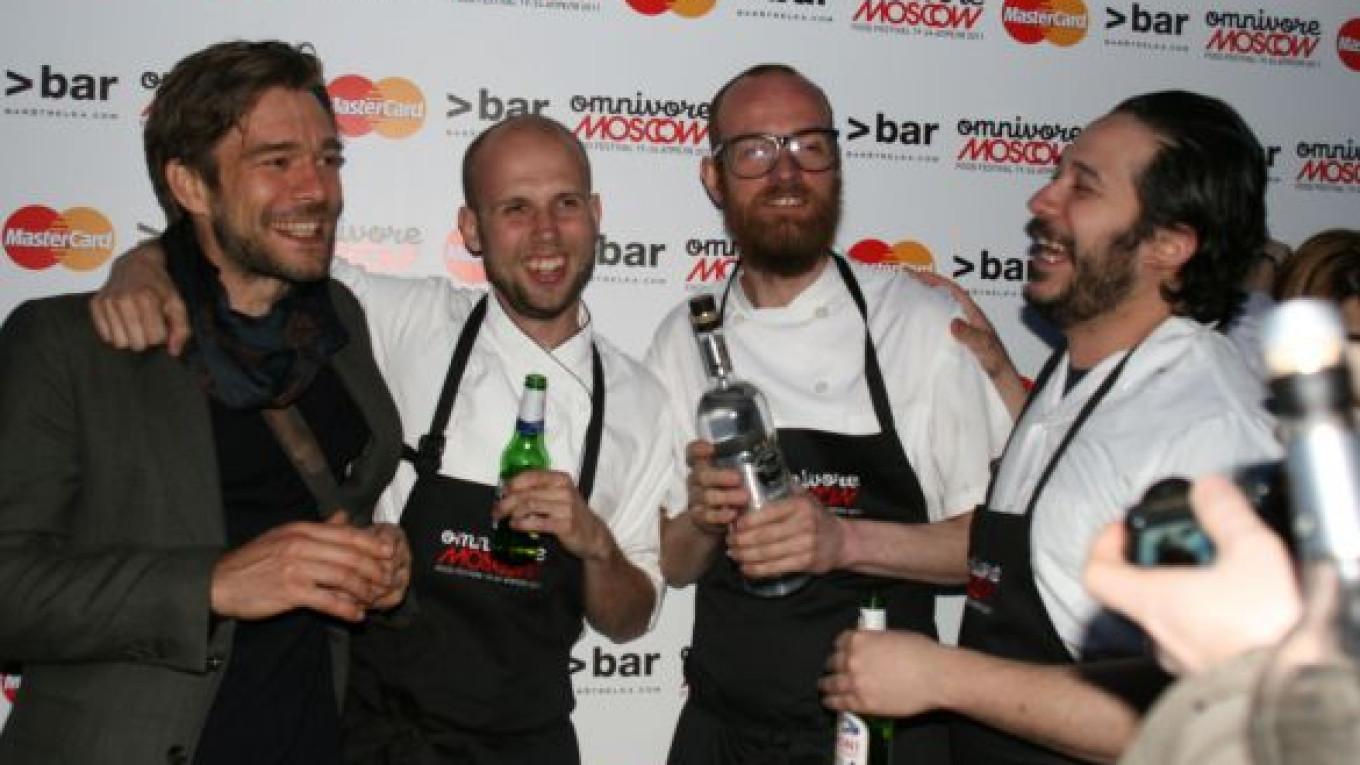Omnivore is an international food festival, originally founded in France in 2005, and now organized in other countries as part of its Omnivore World Tour.
The festival's main objective is to provide a platform for talented young chefs while promoting new concepts and techniques. It returns to Russia for its third year in a row, in late April.
The Moscow Times sat down with creator and director of Omnivore World Tour Moscow, Natalia Palacios, who spoke about the evolution of dining out in Moscow, the limitations and challenges the festival has faced, and how the it has grown.
Q: How did the idea of Omnivore in Russia come about?
A: When I moved to Paris more than a decade ago, I began to write about food for several Russian magazines. That's how I started going to various food festivals, including Omnivore, which was launched in Doville, then moved to Havre and then to Paris.
Omnivore was touring around France in the beginning. I was also helping to organize several food events in Moscow and realized that Moscow needed a food festival of its own. I thought that Omnivore's approach translated well in Moscow. When I came to Omnivore's director with this idea, he was doubtful. My friends in the food industry in Moscow were also quite skeptical. It took me two years to organize the first Omnivore in Moscow in 2011.
Q: How was the first Omnivore received by chefs and the public?
A: Right up until the festival itself, even some of the participants weren't sure that it would actually take place. But when it did, and it turned out to be quite popular, and their attitudes changed.
Success depended on several things: the right place, the right participants, and the right public. Even the weather played on our side — our closing party was organized at an open space, Strelka, and we kept checking the forecast for the end of April.
It was Easter, and I saw people kissing on the streets, and that's when I knew that everything was going to turn out alright.
Q: How will this year's Omnivore be different?
A: The level of participation is now different. Even the chefs who take part every year have started moving in a totally different direction.
There was a Swedish chef from Paris at the first festival who made smoked ice cream using hay. After seeing him perform, Russian chefs realized that a dish can be more than simply a dish; it can be poetry on a plate. ?
Q: Has the situation with restaurants in Moscow improved since the first Omnivore?
A: It's probably no coincidence that 2011 was the year that I finally managed to organize the first Omnivore. 2011 was the year when places like Delicatessen and Ragout opened.
I thought Omnivore would nourish this trend, and more interesting cafes and restaurants would spring up. But time proved me wrong: nothing of the kind is taking place in Russia.
Omnivore is not meant to be just a cool hangout, where chefs get to meet and chat and party. Its main idea is to help young talented chefs with new ideas. However,? there are no means through which they can be expressed. I am a bit sad that there are practically no participants of that kind. Things are moving slowly, but I hope for better.
Q: What's the selection process for Omnivore?
A: When I choose the chefs for Omnivore, I usually have to check out their restaurants and try the food.
If there's no opportunity to do that before the festival, the vetting process becomes complicated. This year we have a chef whose restaurant hasn't opened yet. There is also one who has a restaurant in Nizhny Novgorod that I haven't managed to visit. In these cases, I talk to the chefs, find out what restaurants they worked or interned at, how they think, what their philosophy is. I'd rather choose someone who goes to the same world-class restaurants and likes the same food that I do, rather than someone who never leaves his restaurant in Moscow but gets great publicity.
Q: What are your favorite places in Moscow where you go when you are not working?
A: The thing is, whenever I'm in Moscow, I'm almost always working. I go to Strelka a lot, as I have many meetings with management there, organizing things for the festival.
I also helped them find their new chef, Yves Le Lay. I like Delicatessen; I took my friends there last summer. Ragout is also good. All these places have very different approaches to food, but that's exactly what I like about them.
This year's Omnivore will take place at several venues around the city, April 23 to 27 with the traditional final-day closing party at Strelka. Latest schedule is available at?
Contact the author at [email protected]
Related articles:
A Message from The Moscow Times:
Dear readers,
We are facing unprecedented challenges. Russia's Prosecutor General's Office has designated The Moscow Times as an "undesirable" organization, criminalizing our work and putting our staff at risk of prosecution. This follows our earlier unjust labeling as a "foreign agent."
These actions are direct attempts to silence independent journalism in Russia. The authorities claim our work "discredits the decisions of the Russian leadership." We see things differently: we strive to provide accurate, unbiased reporting on Russia.
We, the journalists of The Moscow Times, refuse to be silenced. But to continue our work, we need your help.
Your support, no matter how small, makes a world of difference. If you can, please support us monthly starting from just $2. It's quick to set up, and every contribution makes a significant impact.
By supporting The Moscow Times, you're defending open, independent journalism in the face of repression. Thank you for standing with us.
Remind me later.


